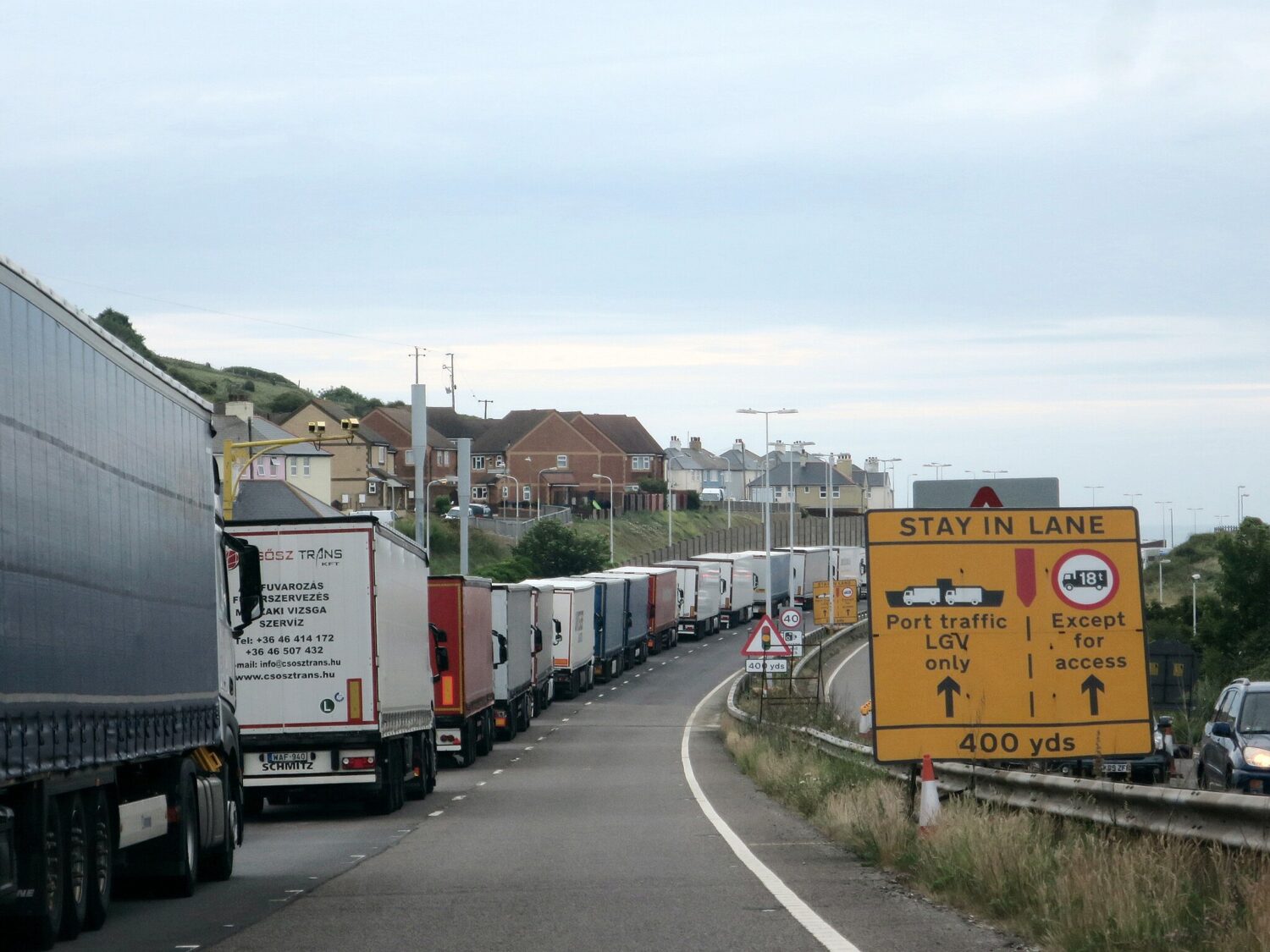Trials of Separation
Improving our relationship with the EU will be no mean feat, argues Andrew Harrop
‘Get Brexit Done’ was the slogan that sealed the deal for Boris Johnson in 2019. But the truth is that, even now, Brexit is not done – and the pain keeps mounting. The latest act of Brexit self-harm will come on Wednesday, when the UK introduces import paperwork for EU food and agricultural products. Physical checks at the border are due to follow shortly after.
Some observers think the government will bottle it at the last minute. With good reason, perhaps: import checks have already been delayed five times. We know that the same restrictions going the other way led to massive administrative hassle and a huge fall in the number of UK firms exporting to the rest of Europe. When the UK reciprocates, costs for businesses will rise, there will be a dent in import volumes, and markets will be less competitive – all of which means higher prices.
Despite these harms, I suspect Labour politicians would rather that the border checks were fully implemented before the next election. Otherwise, it might fall to an incoming Labour administration to complete Brexit for the Tories and preside over another self-inflicted wound. New ministers would have little choice in the matter, partly as the status quo will eventually be challenged by non-EU importers, but also because if we do not introduce EU import checks we will have less to offer up later in search of a better deal.
Nor is Brexit done when it comes to the long-term consequences of the divorce. In economic terms, it is a process not an event: a slow puncture on prosperity that will keep holding growth back for years. The effects will play out throughout the life of the next government. Compared to the counterfactual, there will be less cross-border trade, less competition, less investment, less job creation, less productivity growth, less levelling-up and less pay. There will be more pointless divergence as British law grows further apart from the EU’s “acquis communautaire”. It will be harder for firms to operate in both UK and EU jurisdictions, and harder to take mutually beneficial steps to reintegrate in the future.
Labour has already gone a fair way in explaining how it would respond to these dilemmas in the early years of the next parliament. The party has stated boldly that there will be no return to the single market or the customs union, let alone a debate on rejoining. But as Keir Starmer himself has said, ‘we don’t want to diverge’ especially on environmental, consumer and labour protections. The question now is how to deliver on that aspiration.
The party’s mantra is ‘make Brexit work’ and we can expect Labour to kick off with a serious attempt to reset and institutionalise the UK/EU relationship. An initial surge of goodwill will get things moving, especially if new minsters quickly pick a few areas where they wish to align voluntarily with the EU, such as consumer safety standards. But vibes won’t cut it for long and Labour should aim to quickly agree new machinery for formal coordination and partnership. Shadow ministers have placed particular emphasis on a new structure for security and foreign policy cooperation, but regular, formalised dialogue would help across the board.
Labour has stated boldly that there will be no return to the single market or the customs union, let alone a debate on rejoining
Labour ministers will then need to get stuck into case-by-case negotiations to improve the EU/UK settlement. We know some of their early priorities and the initial technical work has started under Nick Thomas-Symonds in the shadow Cabinet Office team. The party says it will seek realignment on agriculture and food safety to avoid the need for border checks; negotiate mutual recognition of professional standards and qualifications, as a pale imitation of the single market in services; and seek a waiver on travel restrictions for touring artists.
We can add to that list some other fairly uncontroversial priorities for a new administration. Following the Conservatives’ belated readmission into the EU Horizon research collaboration, Labour will eye a return to the Erasmus student exchange initiative. A better solution for manufacturers on rules of origin will also be sought, following a recent three-year delay to regulations that would have crippled the UK car industry’s transition to electric vehicles. Closer alignment on medicines and pharmaceuticals also seems likely and there might be progress on energy markets and emissions trading.
Already this is quite an in-tray, and speaking at the Fabian Society conference on 20 January shadow Northern Ireland secretary Hilary Benn MP was at pains to emphasise that the future relationship would evolve ‘step by step’. The watchword will be pragmatism, with staged, piecemeal agreement based on mutual interest.
But that does not mean it will be easy. Labour is thinking through what it wants from the EU, but there is also the question of what the EU will want from us. The UK has things it can offer, from security assets to wind resources to fishing rights – or even money, as is the case with Norway and Switzerland. But such negotiations are bound to attract controversy. For example, I suspect that people-to-people exchange will be high up the EU’s list of priorities: not just Erasmus and touring artists but a fully-fledged youth mobility migration scheme. This stops well short of free movement of people and would be in the UK’s interests too. But it would require Labour to take on the right-wing media.
Additionally, how flexible is the EU prepared to be about the way reintegration works? A presumption from British ministers in favour of alignment will not be enough for Brussels. In sectors where the UK seeks a better deal, we must ask if there is a sweet spot to be found between Britain voluntarily mirroring EU law on the basis of goodwill and the EU’s insistence on total alignment with its ever-changing rulebook and full oversight by the ECJ. In areas like food, medicines or energy, could robust equivalence schemes be agreed that provide the UK some wiggle room to choose its path? The answer may be no. But if the EU accepts a degree of latitude, paradoxically it might help to facilitate a deeper and broader partnership. The more the UK is a pure rule-taker, the fewer the areas where we will feel comfortable aligning.
Going further, at the Fabian conference Sadiq Khan called for debate on re-entering the single market and customs union. It was a notable challenge to the Labour frontbench line in a performance that was otherwise studiously loyal. However, there is no chance of a Labour government seeking membership of the EU internal market as a whole. The UK cannot be a rule-taker across every area of economic life, even with Norway-style consultation arrangements; and we should not contemplate Brussels regulating the City of London or the reintroduction of free movement of people without the full benefits of EU membership.
The case against the customs union is much less strong. The last few years have proved that the potential upside of an independent trade policy is far smaller than the downside of greatly reduced EU economic ties. Labour’s choice here will really turn on abstract ideas of sovereignty, so what happens may come down to whether ministers can stomach a fight with the Conservatives, Nigel Farage and their friends in the media. Actually rejoining the customs union in a first Labour term is unlikely, as the party will not want to breach a clear manifesto commitment. But don’t rule out ministers starting to lay the groundwork.
In the early years of a future Labour government, the initial moves are pretty clear. But the medium- and long-term outlook is much harder to foresee. On the one hand, there might be less progress on the initial step-by-step ‘Make Brexit Work’ agenda than shadow ministers are expecting and hoping for. Quite minor technical negotiations could drag on, leaving no space to discuss larger reforms that would really move the needle when it comes to economic growth.
On the other hand, the context and possibilities might shift quite fast if Labour is elected. A lot will depend on what happens outside the narrow confines of bilateral talks between London and Brussels. A Trump re-election and another upswing in European populism would focus minds on both sides of the channel. The EU might also be more open to half-way house solutions for the UK, if it is simultaneously seeking staging-posts short of full membership for its western Balkan and Black Sea applicants. Europe is due to change a lot in the next 15 years, irrespective of Britain.
At home, public opinion, the contours of the electoral map and political activism might also shape developments over time. For now, the process of reintegration will be gradual, quiet and technocratic: few public figures wish to make a public, principled or popular case for Europe and there is no appetite for more years of Brexit division. But if there is a pro-rejoin majority for years or even decades, things could start to change.
There might be less progress on the initial ‘Make Brexit Work’ agenda than shadow ministers are expecting and hoping for. Quite minor technical negotiations could drag on, leaving no space to discuss larger reforms
Today support for the EU in opinion polls is broad but not deep. The arguments are untested and the salience of Europe as an issue is low. But it is noteworthy that Sadiq Khan thinks it is in his political interests in London to call for closer ties with the rest of Europe. A lot would have to change for future views elsewhere in Britain to match those found in London now. But never say never. Perhaps Labour will one day start to think aloud about rejoining?
I am almost certain that day will not come during a first Labour term of office. The party contains many passionate Europhiles, but it is likely to follow public opinion not to lead it. Even then, the EU would only ever have us back once it felt that rejoining was the UK’s settled will. That would mean having a Conservative party that was not intent on undoing it all the next time it won power.
This article reflects on a debate I chaired discussing Labour’s plans for the EU at the Fabian New Year conference on 20 January 2024. I am by no means an expert on the EU/UK relationship, and I have benefited greatly from reading and listening to people who are – in particular, I would like to single out the work of Anand Menon, Charles Grant and Peter Foster.
Image credit: Oast House Archive, CC BY-SA 2.0 via Wikimedia Commons

